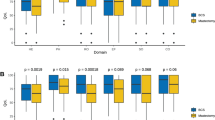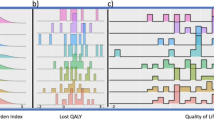Abstract
The question of whether initial prognostic factors in small-cell lung cancer patients have a predictive value for patients' quality of life (QL) during chemotherapy is addressed in the context of a randomised clinical trial comparing early and late alternating chemotherapy (SAKK protocol 15/84). The relative impact of initial tumour stage and performance status, previous weight loss, sex and age on patient-rated QL was analysed over six chemotherapy cycles in 124-130 patients (according to available QL data) with more than 400 questionnaires. Fatigue/malaise, personal functioning, emotional and general well-being were prospectively selected as QL indicators. Predefined summary measures (average QL score over chemotherapy cycles, 'minimum', 'maximum' and 'final' improvement) were analysed separately by scale in various patient groups. General linear models adjusted for treatment arm and response were used to confirm the univariate findings. Within the overall sample, the average QL scores over six cycles were predicted by initial prognostic factors. Patients with poor prognostic factors reported worse QL. Within a limited sample (with baseline QL), patients with poor prognostic factors reported worse QL at baseline and greater improvement under treatment. Graphical comparison of QL patterns over cycles showed permanent discrimination by levels of prognostic factors. The impact of initial prognostic factors was consistently confirmed in the three analyses. Levels of performance status and weight loss best discriminated QL. Initial tumour stage, performance status and previous weight loss can predict QL in small-cell lung cancer during chemotherapy, even after controlling for response to treatment. Our results may contribute to clinical decision-making with regard to the intensity of chemotherapy and QL outcome, especially in patients with extensive disease.
This is a preview of subscription content, access via your institution
Access options
Subscribe to this journal
Receive 24 print issues and online access
$259.00 per year
only $10.79 per issue
Buy this article
- Purchase on Springer Link
- Instant access to full article PDF
Prices may be subject to local taxes which are calculated during checkout
Similar content being viewed by others
Author information
Authors and Affiliations
Consortia
Rights and permissions
About this article
Cite this article
Bernhard, J., Hürny, C., Bacchi, M. et al. Initial prognostic factors in small-cell lung cancer patients predicting quality of life during chemotherapy. Br J Cancer 74, 1660–1667 (1996). https://doi.org/10.1038/bjc.1996.606
Issue Date:
DOI: https://doi.org/10.1038/bjc.1996.606
This article is cited by
-
Clinical significance of the cachexia index in patients with small cell lung cancer
BMC Cancer (2021)
-
Comparison of generic and lung cancer-specific quality of life instruments for predictive ability of survival in patients with advanced lung cancer
SpringerPlus (2016)
-
Quality of life during chemotherapy in lung cancer patients: results across different treatment lines
British Journal of Cancer (2013)



